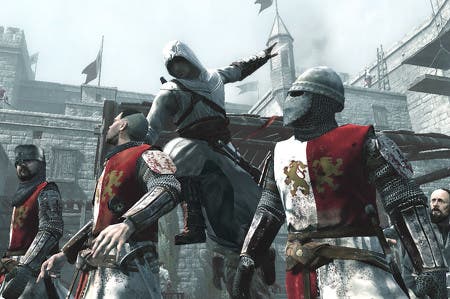Author behind Assassin's Creed copyright lawsuit defends his position
Beiswenger's lawyer shrugs off Amazon 'bombing'.
The novelist suing Ubisoft for allegedly infringing his copyright in the plot of the original Assassin's Creed has defended his lawsuit following an angry response from many fans of the series.
Author John Beiswenger's lawyer, Kelley Keller, told Eurogamer that her client is legally obliged to protect his copyright and won't be deterred by a recent spate of review 'bombing' of his publications on Amazon.
"We understand that many gamers are upset about the litigation and potential for delay in the release of the next Assassin's Creed video game, and as a result of that anger have been posting negative comments on Amazon - and other forums - about our client and his novel Link," said Keller.
"However, copyright laws exist to protect authors and creators from others who copy or create works that are, under the law, substantially similar; failure to enforce copyright laws renders them meaningless.
"The Amazon 'bombing,' storm of negative comments, and threats to our client have no bearing on the appropriateness, merits, or outcome of this suit. They have no material effect on the legal claims."
Beiswenger's suit, filed last month, alleges that Ubisoft recycled story elements from his 2003 novel Link. He's seeking up to $5.25 million in damages as well as a halt on the release of Assassin's Creed 3 later this year.
"Copyright holders are entitled to statutory damages as set forth in the complaint. Calculations are set forth therein. The law is very clear on damage amounts," replied Keller when asked to qualify that sizeable sum.
And why the desire to stop AC3 from seeing the light of day?
"Copyright holders are entitled to injunctive relief under the law to stop continued infringement," she added.
Beiswenger claims that his book and Ubisoft's game share similar themes - namely religion, assassins and a battle between good and evil. He also complains Assassin's Creed's Animus MacGuffin bears an uncanny resemblance to "a link device and process whereby ancestral memories can be accessed, recalled, relived, and re-experienced by the user" as featured in his book.
Some might argue those are rather broad similarities - is Beiswenger not willing to entertain the notion that it might just be mere coincidence?
"No. If we believed the similarities were mere coincidences, our client would not have filed suit," replied Keller.
Nearly five years have passed since Assassin's Creed hit the shelves. Why did it take so long for Beiswenger to make his claim?
"The claim has been brought within the applicable time periods required under the law," said Keller.
She wouldn't comment when asked how Beiswenger came upon the alleged similarities, nor would she detail what evidence he has that Ubisoft had access to his work prior to the release of Assassin's Creed in 2007.

